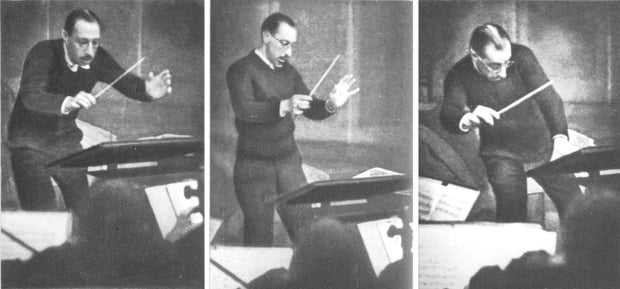 Igor Stravinsky - Photo by F Man via Wikimedia Commons / CC BY 2.0
Igor Stravinsky - Photo by F Man via Wikimedia Commons / CC BY 2.0
Even if you’re not a classically trained musician, you’ll probably recognize names like Beethoven, Bach, and Chopin. And as we’ve seen before, knowing your classical composers can be a big help for songwriters. Not only do hitmakers often lift melodies straight from the classics, but developing an ear for classical music can also greatly improve your melodic, harmonic, and rhythmic sensibilities for writing in any style.
Those great composers with the instantly recognizable names are responsible for shaping what popular music sounds like today to a great degree, but at the same time, there are plenty of other composers who don’t have as much name recognition, but who still have a major influence on today’s popular musicians. Some of these composers are even still alive today. Here’s a look at five contemporary composers who have had the biggest influence outside of the classical academy.
1. Terry Riley
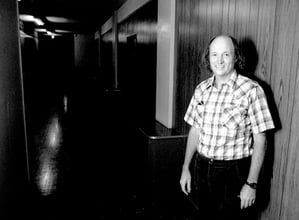 Photo by Brian McMillen via Wikimedia Commons / CC BY 3.0
Photo by Brian McMillen via Wikimedia Commons / CC BY 3.0
Minimalism has had a huge impact on rock, pop, and alternative music, and one of the most influential composers to come out of the minimalist movement is Terry Riley. An early innovator in the minimalist school, Riley took Western composition into new territory by borrowing heavily from jazz, Indian classical music, and avant-garde composition.
Some of Riley’s biggest early fans were rock musicians like the Who’s Pete Townshend and the Velvet Underground’s John Cale, which explains why Riley’s music has become so influential outside of the classical world. Riley was even recognized by the Who as half of the namesake for their song "Baba O’Riley."
Just listen to some of the keyboard patterns from Riley’s 1969 pioneering electronic work “A Rainbow in Curved Air,” and see how those patterns influenced people like Townshend and Cale in their own playing.
2. Arvo Pärt
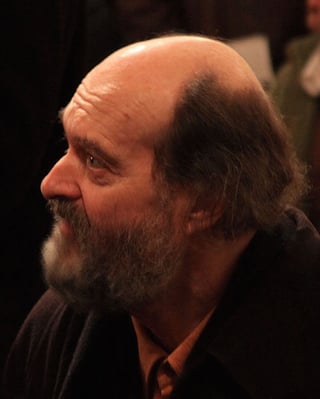 Photo by Woesinger via Flickr / CC BY-SA 2.0
Photo by Woesinger via Flickr / CC BY-SA 2.0
If Riley represents the rock 'n' roll side of minimalist composition, Arvo Pärt is the genre’s quiet yet brilliant younger brother. Since the 1970s, Pärt has become the definitive composer in a school known as holy minimalism, which explores sacred themes through minimalist composition. His trademark “tintinnabuli” style, which involves an arpeggiated tonic triad played over a diatonically moving counter-melody, has been hugely influential, especially in the realm of film music.
Take a listen to "Spiegel im Spiegel" and see if you can remember how many films and TV shows you’ve heard this piece in. Then listen to how Ólafur Arnalds, who writes music for the TV show Broadchurch, adapts Pärt’s tintinnabuli style in his piece "Ljósið."
3. Karlheinz Stockhausen
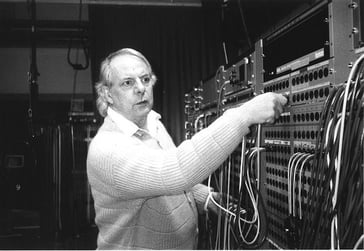 Photo by Kathinka Pasveer via Wikimedia Commons / CC BY 3.0
Photo by Kathinka Pasveer via Wikimedia Commons / CC BY 3.0
German composer Karlheinz Stockhausen was one of the earliest and most important innovators in electronic music, and also lived as a contemporary of Terry Riley. While he used some of the same tools at Riley, his music was considered much more avant-garde, relying on elements of serialism, musique concrete, and aleatory music rather than the more modal sound of Riley and other minimalists.
This didn’t stop him, however, from achieving popular acclaim. In fact, it’s the Beatles who are credited with bringing Stockhausen into the popular consciousness. Some of the band’s more experimental works such as “Revolution 9” and “A Day in the Life” were heavily influenced by Stockhausen’s compositions, and the band even went so far as to include Stockhausen’s face on the cover of their Sgt. Pepper’s Lonely Hearts Club Band album.
Listen to how the Beatles play with sounds in “Revolution 9” and compare that to Stockhausen’s 1956 musique concrete work, “Gesang Der Jünglinge.”
4. Henryk Górecki
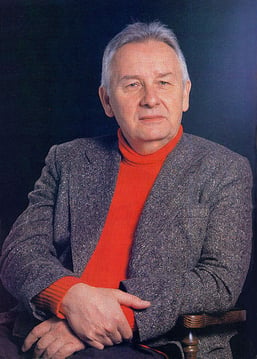 Image via Wikimedia Commons; public domain
Image via Wikimedia Commons; public domain
Though he was largely unknown outside of his native Poland until the 1990s, Henryk Górecki eventually went on to become one of the most recognized and most successful contemporary classical composers before his death in 2010.
While Górecki’s earlier works bear a resemblance to the atonality of Stockhausen, his later works are beautiful examples of the holy minimalism. In particular, his third symphony, the “Symphony of Sorrowful Songs,” has had a major influence on contemporary alternative artists like DJ/producer Ital Tek and saxophonist Colin Stetson, who has played alongside artists like Bon Iver and Arcade Fire.
In fact, Stetson was so taken with Górecki’s third symphony that he recorded his own version of it, which you can listen to here, and compare it with the original below.
5. Igor Stravinsky
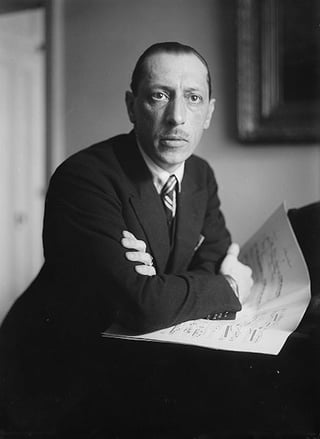 Image via Wikimedia Commons; public domain
Image via Wikimedia Commons; public domain
No list of contemporary classical composers would be complete without a mention of Russian composer Igor Stravinsky, who lived from 1882 to 1971. A relentless innovator, Stravinsky was known in his time for constantly pushing the boundaries of classical music. In fact, his ballet "The Rite of Spring" nearly caused a riot when it was premiered in Paris in 1913.
Today, Stravinsky is remembered for his rhythmic and harmonic innovations such as the use of dissonant tones and clashing ostinato patterns in pieces like "The Rite of Spring" and "The Firebird." That influence can be heard today in the music of a number of musicians who are continuing to push the boundaries of their own genres, including saxophonist Kamasi Washington, who was a major player on Kendrick Lamar’s latest album.
Washington credits Stravinsky’s “Symphony of Psalms” as a major influence for his recent album, The Epic. Listen to how Washington incorporates the pulsing rhythms and complex harmonic textures of the “Symphony of Psalms” into his piece “Re Run.”
The world of classical music is constantly evolving, and today, that world is becoming more and more intertwined with other musical genres. Whether it’s serialism, musique concrete, holy minimalism, or something totally new and innovative, the latest developments from the classical academies are spilling over into the popular music mindset quicker than ever before.
So even if you’re not formally studying contemporary classical music, keeping an eye on the latest musical innovations can be hugely inspirational for your own songwriting and composition, no matter what type of music you play.
Casey van Wensem is a freelance composer, musician, and writer living in Kelowna, B.C., Canada. You can hear his musical work at birdscompanionmusic.com and read his written work at caseyvanwensemwriting.com.


